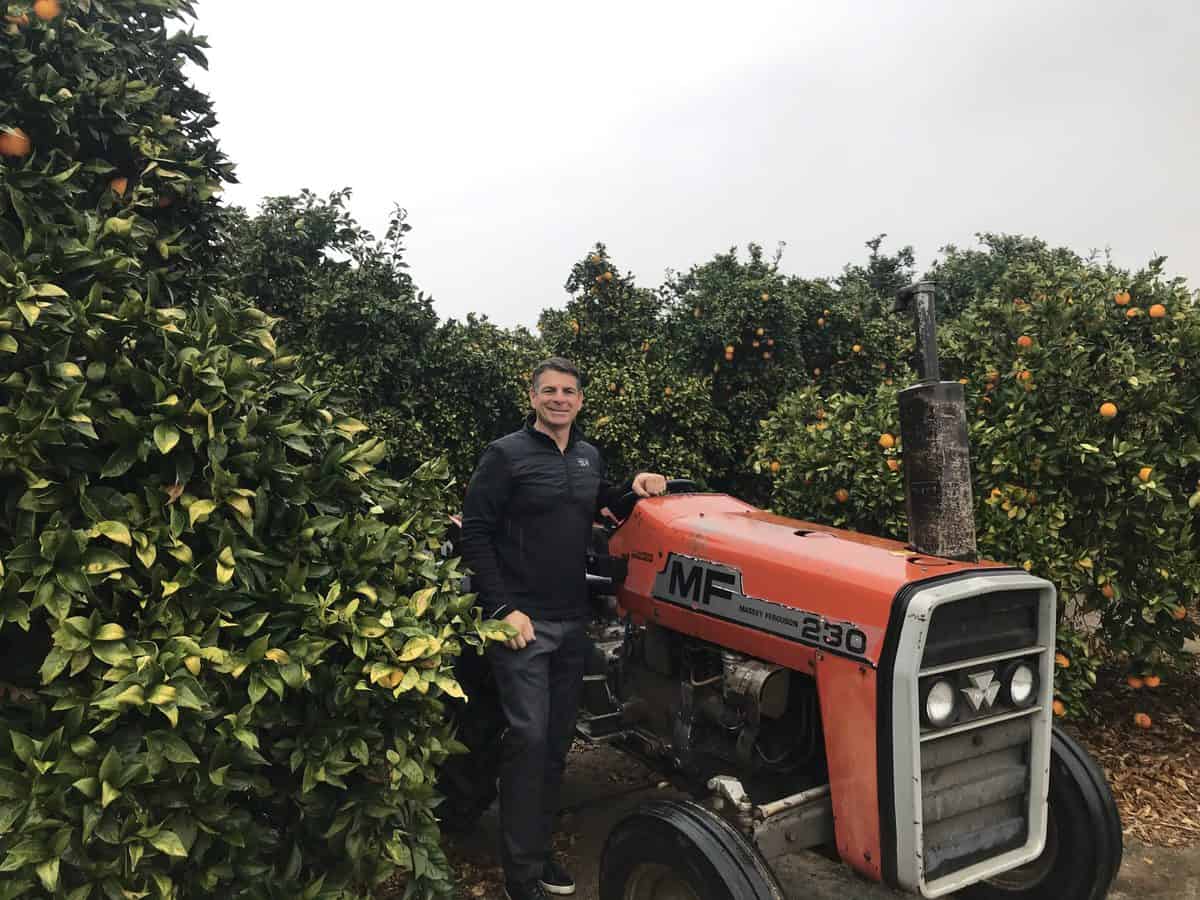Meet A Farmer – Eric Schmidt of Eric Schmidt Farms
By day he’s a Fresno County Deputy Sheriff, but in the early mornings, evenings, and weekends, he’s a citrus farmer in Central California. Meet Eric Schmidt, a farmer who’s not afraid of facing unpredictable weather, either on his farm or while hiking in backcountry.
CA GROWN: What are you doing today?
Eric: My day starts early at the gym. Once I get home, I go to my full-time day job as a deputy sheriff. Today, I’ve also been to each ranch to check on the amount of water on the ground. This is the time to apply preemergence treatment for weed control for next season. It’s been a challenge because of the rain lately. The product works best when it’s applied before the rain and I have only about 30 percent done so far. So I’m keeping a close eye on weather conditions to gauge when I can wrap that up. The rest of my day is spent at work as a deputy sheriff.
CA GROWN: What is your favorite thing about farming?
Eric: I enjoy the challenge of working with mother nature and figuring out how to be efficient through the cycles of the seasons. I like the whole process of farming; from pruning to using bees for pollination, to harvest. This time of year, I closely watch for freezing conditions and how to counteract any potential damages. The challenge is always figuring out how to counteract the effects of weather. It can be stressful at times, but it’s worth it.
CA GROWN: How do you give back to the community?
Eric: I work hard to give both my time and financial donations to make the Central Valley a better place. I volunteer with projects in underserved parts of Fresno working with school aged children. Before the kids leave, we give them sack lunches. For me, investing in young people is so fulfilling. It’s great to influence young lives and shape the next leaders in our community. Since a lot of people in this area live in poverty and have food insecurity- I also make financial donations to organizations that provide food for those in need. As a farmer, I feel it’s necessary to give back and filling stomachs is an ideal way.
CA GROWN: What drew you into the farming profession?
Eric: I grew up in the Sanger area and was surrounded by farmland. After I finished college, I moved to the city- but quickly realized I was more suited for the country life. I purchased my first ranch in 2001. Even though I went into criminology and law enforcement, I find farming a nice change of pace and really enjoy the solitude of driving a tractor. I like the balance of farming and public service. My law enforcement career has allowed me to continue purchasing land and expanding my farming operations.
CA GROWN: What are your hobbies or past times when you are not farming?
Eric: I love spending time outdoors. I love backpacking, golfing, fishing, fly-fishing and wine tasting. I do a fair amount of backpacking and don’t mind the temperature fluctuations, even though they can be extreme. In fact, I find backpacking during storms to be quite an adventure. In the winter, I enjoy skiing.
CA GROWN: What advice would you give to someone who wants to get into farming?
Eric: The most important thing I would recommend is to do as much research as possible. Go out and find farmers who are established and ask them about the challenges they have faced. Start with one crop and once you get that down- then you can venture out to new varieties. Once you establish yourself, you can start expanding from there. In the beginning, it’s a lot of work and a lot of money. Understand that the first few years you probably won’t make much, if any- but eventually as the crops mature, the profits should increase. Patience is definitely key.
CA GROWN: What are one or two things you do on the farm to be sustainable?
Eric: Since I am in the citrus industry, we have audits from third party inspectors that we must pass every year. We are constantly updating our business practices to conserve water. At my ranches, I work hard to avoid unnecessary runoff or other water wasting. I converted my pumps to use surface water instead of pulling it out of the ground. As a result, my ground water tables are increasing and nitrogen levels are decreasing. I believe this is one step to help become more sustainable in the future. I do a lot of research to stay on top of current processes that will preserve the environment.


Bees are not needed for citrus, the citrus flowers are dioecious having both male and female in the same flower.
I put bees in my citrus because I get money from the beekeepers and honey from him as well. It seems to improve my flower set but not proven. I farm lemons, oranges, and mandarins in Fresno and Tulare Counties.
We also love farming on a very small scale. We have various citrus. My issue is with the government regulations and water. Why make it so difficult and strict for farmers to save water and fine us if we are over using it? They allow thousands of new home developments; especially in Southern California. Millions of gallons of water is wasted on their useless plants and shrubs for the development’s landscaping. Also, this state allows millions of gallons of snowpack and rainwater to flow right out into the Pacific! Not fair ! Not right! Growing nutritious food is more important than more money in greedy developers’ pockets!
What an inspiring story! Eric Schmidt’s commitment to sustainable farming and his deep connection to the land highlight the important role that farmers play in our food systems. It’s great to see how passion and innovation can lead to thriving practices that benefit both the community and the environment.